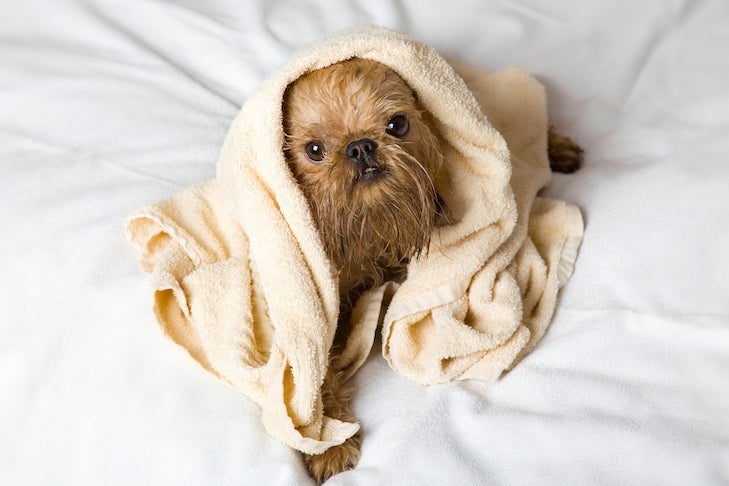AKC is a participant in affiliate advertising programs designed to provide a means for sites to earn advertising fees by advertising and linking to akc.org. If you purchase a product through this article, we may receive a portion of the sale.
We’ve all had this experience—a summer day, a drive to the lake, and a refreshing dip in the clear cool water. Then there’s the agonizing drive home, as you try to keep your eyes on the road, even as you’re about to pass out from the smell of wet dog.
Ever wonder what the recipe is for this particularly pungent scent? Scientists did too, and some have started sniffing around for the chemical components that raise this unique stink.
Andy Brunning, a British chemistry teacher, has distilled the essence of the complex molecular reactions into an infographic posted on his blog, Compound Interest. This is just one in his series of infographics offering scientific explanations for odors that greet—or assault—our nostrils on a typical day, like new car, toilets, coffee, fresh-cut grass, and bacon, for example.
The Chemistry Behind Why Dogs Stink
Aroma of wet dog, Brunning explains, starts with a cast of tiny critters—yeasts and bacteria—that take up residence on your pet. “When you’re taking your dog for a walk,” he says, “you’re actually taking a whole host of microorganisms for a stroll, too.”

In the process of going about their lives, they leave behind “micro excreta” in the form of volatile organic compounds. The smell of wet-dog, Brunning says, comes from moisture evaporation that carries some of those compounds with it. Brunning characterizes the signature odor as a mixture of scents, including almond, fruit, honey, and mushroom, with hints of sulfur and feces.
He notes that there haven’t been millions of dollars dedicated to the study of this problem, and there’s much more to learn. But he ends with a call to action. “[We] at least know that it’s not the dogs themselves we should be blaming for the smelling terrible, but rather the microorganisms they carry,” he says.
Do Certain Breeds Smell Worse Than Others?
While any dog can get smelly, some dogs are more prone to a bad scent based on their build. For example, consider a Chinese Shar-Pei, which has large skin flaps that can retain moisture. All wrinkly-skinned and wrinkly-faced breeds — such as Pugs, Bulldogs, and French Bulldogs — should get extra attention and a cleaning under their flaps.
Some dogs, like Basset Hounds, naturally have more oily skin. Some are also known for drooling, like the Mastiff, Newfoundland, and other large dogs. This causes the area around their mouths to be perpetually moist.
If your dog tends to get slobbery, keep some rags and pet wipes on hand and regularly dry up any damp areas.

How to Get Rid of Wet Dog Smell
Bathing your dog routinely can do a lot to keep dog smells away. But drying is important, too. Consider investing in a dog blow dryer or a heavy-duty dog towel that can help dry your dog more quickly. If this is too difficult for you to do at home, take your dog to a professional groomer. Generally, bathing your dog once to twice a month is plenty.
Keep your dog’s belongings clean, too. Collars and harnesses often retain smells and should be washed regularly. You can wash a nylon collar in the laundry, but leather collars may need a special leather cleaner. Waterproof collars can also help keep moisture away. Regularly clean your dog’s other belongings, including their bed and toys.
Pay attention to what your dog does in the house. After getting back from a walk in the rain does your dog rub against the couch or roll on the floor? If your dog comes home wet, it’s best to dry them before they get a chance to move around the house. You might consider investing in couch covers or even higher-quality bedding if your dog sleeps in your bed.
Ultimately, if your dog’s smell seems abnormal or you can’t seem to get it to go away, consult your veterinarian and a professional groomer.
This article is intended solely as general guidance, and does not constitute health or other professional advice. Individual situations and applicable laws vary by jurisdiction, and you are encouraged to obtain appropriate advice from qualified professionals in the applicable jurisdictions. We make no representations or warranties concerning any course of action taken by any person following or otherwise using the information offered or provided in this article, including any such information associated with and provided in connection with third-party products, and we will not be liable for any direct, indirect, consequential, special, exemplary or other damages that may result, including but not limited to economic loss, injury, illness or death.

